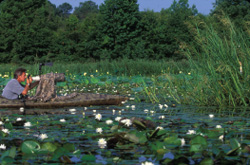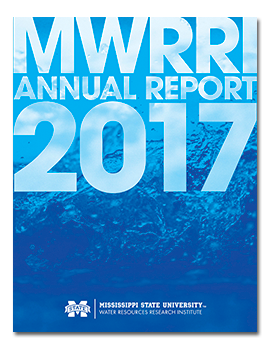Volume 1, Issue 1 October 2007
AQUATIC INVASIVES
Karen Brasher and Andrea Cooper
Many species of fish and birds make their home at Mississippi's largest surface water impoundment, the Ross Barnett Reservoir. Now, however, new residents—non-native aquatic plants- are invading the reservoir.
"The reservoir provides many recreational opportunities, including campgrounds, parks and trails, as well as residential areas," said John Madsen, assistant research professor in MSU's GeoResources Institute. "However, in recent years, invasive species have become an increasing problem on the reservoir."

Introduced from other parts of the world, invasive aquatic plants affect aesthetics, drainage, fish and wildlife habitat, water quality, irrigation, navigation, recreation, and ultimately land values, Madsen added.
Scientists from the Mississippi Water Resources Research Institute and MSU's GeoResources Institute are developing an aquatic plant management plan for the reservoir. The first step is to map the current distribution of non-native plants in the reservoir.
Although only three of the 14 observed plant species observed in the initial 2005 survey were invasive, these non-native plants occurred one-third as many times as native plants. In 2006, four of the 19 observed plant species were exotic inavasives, and retuls of the 2007 survey are still being compiled.
"The invasive plants are so prevalent now that a series of warm winters could allow them to spread to new areas throughout the reservoir," explained Mary Love Tagert, assistant research professor in Mississippi Water Resources Research Institute.
Invasive species not only affect water quality, especially oxygen and temperature, they also can play havoc with fish populations. By changing the structure of the shallow, weeded areas of the reservoir, they impact the growth, survival and health of fish populations. The long-term result will be a significant reduction in recreational fishing on the reservoir.
The non-native plants also affect other species of wildlife, such as birds, making it difficult for them to find a good meal. Fewer birds would impact another popular recreational activity at the reservoir—bird watching.

Wildlife photographer Joe Mac Hudspeth Jr. has already had to abandon some of his usual places for photographing birds. One of Hudspeth's favorite reservoir spots to photograph blue-winged teals is now uninhabitable because of invasive plants.
"I wasn't able to photograph blue-winged teals last spring because the 'hole' they had been frequenting for several years is so thick that they can't land in any water," Hudspeth said. There are other places in Mississippi suffering from the invasion as well.
"The back waters of Bluff Lake at Noxubee National Wildlife Refuge were invaded so badly that park officials drained Loakfoma Lake to try to stop the nuisance plants," Hudspeth added.
Without control measures, non-native species like hydrilla can easily encompass more than 7,000 acres of the reservoir. Monitoring and controlling the spread of invasives is crucial to preventing the destruction of vital ecosystems that provide wildlife places to live and feed and provide people with many types of recreation and clean drinking water.
FROM THE DIRECTOR

Welcome to the inaugural issue of the water resources newsletter. This newsletter is designed to keep you informed of activities within the institute.
The Mississippi Water Resources Research Institute (MWRRI) became a component of the Forest and Wildlife Research Center last year. At that time, Jeff Ballweber, associate director, had accepted a position at Colorado State University (CSU). Jeff was invaluable to the operation of the MWRRI and agreed to work half-time for the MWRRI and half-time for CSU. Jeff has now assumed his duties full-time as a community development specialist at CSU and we wish him well. Kim Steil, SE-TAC coordinator, has also decided to work on her dissertation full-time and we wish her well in this endeavor. Amy Schmidt has replaced Kim as SE-TAC coordinator and Jonathan Pote serves as the principal investigator. It is a pleasure to welcome Jessie Schmidt as coordinator of the MWRRI. Jessie has been instrumental in running the day-to-day office management of MWRRI and will be coordinating focus sessions with other campus water researchers and looking for external sources of funding for water and land-related issues.
The MWRRI remains solid on its mission to develop and coordinate research, training programs, and technology transfer. Projects currently funded through MWRRI are conducting research with faculty at both MSU and at other state institutions.
MWRRI hosted its annual conference this past April and the 26 full papers from the conference have been published in the proceedings. The first student poster contest and student presentation contest were very successful with over 17 students participating. In the student presentation contest, sponsored by Weyerhaeuser and Clearwater Consulting, garnering first place was Peter Schweizer, a MSU alumnus and doctoral student at Ohio University. Second place winner Ryan Wersal is a graduate student and research associate in Mississippi State University's GeoResources Institute. The third place winner was Afrachanna Butler from Jackson State University. Congratulations to all of the winners and participants. The conference was well attended and we are excited about planning the 2008 conference. The call for abstracts has been sent to our water list serve. We invite you to participate as a moderator, presenter, or as a student competitor.

FUNDED RESEARCH PROJECTS
Projects funded by the MWRRI

Two Mississippi State University researchers, Gary Ervin, associate professor in biological sciences and Todd Tietjen, associate professor in wildlife and fisheries, are working on a project to provide a quantitative ecological evaluation of wetland and water quality impacts resulting from groundwater supplementation to a major stream in the Lower Mississippi Alluvial Stream.
Charles Wax, professor in Mississippi State University's Geosciences department, is working on a project to determine causes of short-term aquifer declines, primarily cultural water uses and climatological processes, with a conscious effort to exclude the effects of river recharge or extraction. The spatial scope of the research is the central part of the Delta, and the temporal scope is a period from 1980-2006. Primary objectives are to assess the effects of agricultural demands/uses and climatological variability on withdrawal of water from the shallow alluvial aquifer.
Gregg Davidson at the University of Mississippi is studying if lake-wetland systems in the Delta contain lead and arsenic to discover if they were initially deposited in the wetland and later remobilized by flooding and aeration events.
Externally funded projects
The Southeastern Regional Small Public Water Systems Technical Assistance Center (SE-TAC) projects includes outreach and educational training in proactive emergency preparedness for small water utilities; disinfection by-products; a GPS/GIS conversion pilot project; disaster response, reimbursement, and funding at Edisto Beach; Stage 2 Disinfectants and Disinfection Byproducts Rule training; and enhancing the performance of small water systems through shared management. For more information contact Amy Schmidt, aschmidt@abe.msstate.edu or 662-325-8279.
Mary Love Tagert, assistant research professor, is conducting research on projects including St. John's Bay and Jacksonville, Florida to assess the water quality impacts of onsite wastewater systems, organization of a voluntary Luxapillila Creek Watershed Alliance, aquatic plant management support for the Pearl River Valley Water Supply District, and improved prediction of surface water quality.
INFORMATION REQUEST
The Gulf of Mexico Research and Information Needs Project (GMRP) has recently conducted a survey to identify watershed and coastal related research needs. GMRP is coordinated regionally by four Sea Grant programs and engages with local, state, federal, university, non-government and international agencies/organizations to identify and address regional needs.
The results of the survey are available on the project web site masgc.org/gmrp.
Finally, one of the five GMRP regional stakeholder workshops will be held in Biloxi on January 17, 2008 to refine the research needs identified in the survey. More details and a link to register for this free workshop will be available shortly from the GMRP web site.
For more information about the GMRP please contact Steve Sempier via e-mail at stephen.sempier@usm.edu or by phone at 662-325-5509.
UPCOMING EVENTS
November 7-9, 2007. NWRA Annual Conference. Hyatt Regency, Albuquerque, NM. For more information, www.nwra.org.
November 13, 2007. Review proposals for United States Geological Survey (USGS) projects.
November 13-14, 2007. MWRRI Advisory Board meetings. Held in conjunction with the Forest Resources Advisory Meetings, MSU campus, Thompson Hall.
November 16, 2007. Review proposals for Southeast Regional Small Drinking Water Systems Technical Assistance (SE-TAC) projects.
December 5, 2007. MWRA Board of Directors meeting at MSU.
December 5-6, 2007. Ensuring Water Supplies for Northeast Mississippi's Future Growth and Development Conference. MSU campus, Hunter Henry Center.
December 6, 2007. 2008 Conference planning committee meeting at MSU.
January 4, 2008. Deadline for abstract submission for 2008 MWRRI Annual Conference.
April 15-16, 2008. MWRRI 38th Annual Conference. Hilton Hotel, Jackson, MS.
Mississippi Water Resources Research Institute (MWRRI)
The institute exists as both a federal and a state research unit. Established in 1964, the MWRRI is one of 54 institutes (one in each state, The District of Columbia, Guam, Puerto Rico, and the Virgin Islands) that form a national network to solve water problems of state, regional, or national significance. In 1983, the Mississippi legislature formally designated the MWRRI as a state research institute. Federal funds designated for the institute are used to consult with state water officials to develop coordinated research, technology transfer and training programs that apply academic expertise to water and related land-use problems. These various activities are funded through an annual grant from the United States Geological Survey (USGS). Mississippi state appropriations provide additional funds for cost share. The institute also assists state agencies in the development of a state water management plan, maintaining a technology transfer program, and serves as a liaison between Mississippi and federal funding agencies.
Discrimination based upon race, ethnicity, religion, gender, national origin, age, disability, or veteran's status is a violation of federal and state law and MSU policy and will not be tolerated. Discrimination based upon sexual orientation or group affiliation is a violation of MSU policy and will not be tolerated.
